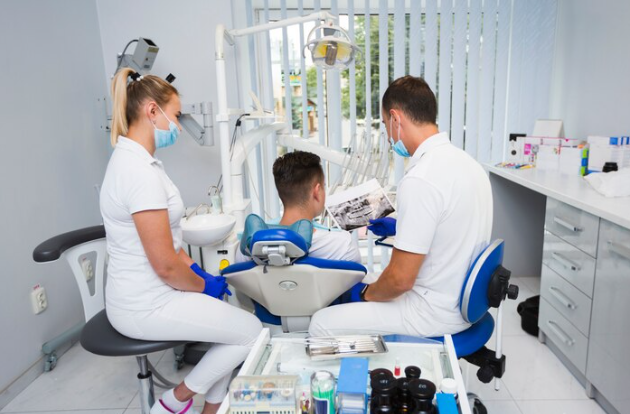Pediatric dentists do more than clean and protect children’s teeth—they often uncover valuable insights into a child’s behavior and overall health by examining their oral habits and dental development. Patterns like teeth grinding, nail-biting, or uneven wear can signal stress, anxiety, or developmental issues. Additionally, the condition and growth of teeth reveal nutrition, hygiene habits, and even genetic factors that influence a child’s physical and emotional well-being. By observing these subtle clues, pediatric dentists gain a deeper understanding of each child’s unique needs beyond just oral care.
This behavioral decoding allows dentists to tailor their approach, providing treatment and guidance that supports healthy growth and emotional comfort. For example, recognizing signs of anxiety through dental behaviors helps create a gentler, more reassuring environment during visits. Pediatric dentists often collaborate with parents, educators, and healthcare providers to address underlying challenges that affect a child’s dental health and behavior. Ultimately, teeth become a window into childhood development, offering valuable clues that help foster lifelong wellness and confidence.
How do pediatric dentists identify emotional stress through dental patterns?
Pediatric dentists often spot signs of emotional stress in children by carefully observing specific dental patterns and behaviors during exams. Certain oral habits and conditions serve as clues that a child may be experiencing anxiety, tension, or emotional challenges. Common dental indicators of emotional stress include:
- Teeth Grinding (Bruxism): Frequent grinding or clenching of teeth, especially at night, often signals stress or anxiety in children.
- Nail Biting or Cheek Chewing: These repetitive behaviors can physically manifest nervousness or emotional discomfort.
- Uneven Tooth Wear: Excessive wear on certain teeth may indicate chronic tension-related grinding.
- Poor Oral Hygiene or Neglect: Stress can decrease motivation for self-care, resulting in cavities or gum problems.
- Frequent Mouth Sores or Ulcers: Emotional stress can weaken the immune response, making children prone to oral lesions.
- Delayed Dental Development: In some cases, stress and associated health issues can affect the timing of tooth eruption or jaw growth.
By recognizing these patterns, pediatric dentists address dental concerns, provide supportive care, and, when necessary, refer families to professionals who can help manage the child’s emotional well-being.
Can childhood habits be detected by examining tooth development?
Yes, childhood habits can often be detected by examining tooth development and oral structures. Pediatric dentists observe teeth size, shape, alignment, and wear to gain insights into behaviors that may affect dental health and overall growth. Some habits reflected in tooth development include:
- Thumb or Finger Sucking: Prolonged sucking can cause misalignment, such as an open bite or protruding front teeth.
- Tongue Thrusting: This habit can impact how teeth grow and align, often resulting in an anterior open bite or speech difficulties.
- Mouth Breathing: Children who habitually breathe through their mouths may show signs like narrow dental arches or altered jaw growth.
- Chewing or Biting Objects: Frequent chewing on pencils or toys can cause uneven tooth wear or damage.
- Grinding (Bruxism): Excessive tooth wear or enamel loss can indicate nighttime grinding linked to stress or misalignment.
By evaluating these developmental signs, pediatric dentists can identify and address harmful habits early, guiding parents and children toward healthier behaviors supporting oral and facial growth.
What dental signs may reveal behavioral challenges in young children?
Dental signs can often provide important clues about young children’s behavioral challenges or emotional struggles. Pediatric dentists look for specific indicators that suggest a child may be experiencing stress, anxiety, or developmental difficulties.
Common dental signs linked to behavioral challenges include:
- Teeth Grinding (Bruxism): Often a response to stress or anxiety, frequent grinding can cause tooth wear and jaw discomfort.
- Nail Biting or Cheek Biting: These repetitive behaviors may signal nervousness, frustration, or difficulty coping.
- Poor Oral Hygiene: The inability to maintain oral care can be related to attention issues or sensory sensitivities.
- Frequent Dental Trauma: Children with impulsivity or coordination challenges may have more accidents, resulting in chipped or fractured teeth.
- Delayed Tooth Eruption or Abnormal Growth Patterns: Sometimes linked to developmental delays or nutritional deficiencies.
- Oral Habits Like Thumb Sucking Beyond Toddler Age: Persistent habits may indicate difficulty with self-soothing or anxiety.
Recognizing these signs allows dentists to collaborate with parents and healthcare providers to support the child’s overall well-being, addressing dental health and underlying behavioral needs.
How is tooth wear connected to behavioral concerns in children?
Tooth wear in children can be more than just a dental issue—it often signals underlying behavioral or emotional concerns. Pediatric dentists pay close attention to wear patterns because they can reveal stress-related habits or developmental challenges that affect a child’s overall well-being.
Here’s how toothwear connects to behavioral concerns:
- Teeth Grinding (Bruxism) is one of the most common causes of tooth wear in children. Grinding is often linked to anxiety, stress, or emotional tension. It may occur during sleep or periods of heightened worry.
- Nail Biting and Cheek Chewing: These repetitive, stress-related behaviors can contribute to localized tooth wear and soft tissue irritation.
- Habitual Biting of Objects: Children who frequently chew on pens, toys, or clothing may show uneven wear caused by coping mechanisms for boredom or anxiety.
- Sensory Processing Issues: Some children with sensory sensitivities may bite or chew more aggressively, leading to accelerated tooth wear.
- Emotional or Behavioral Disorders: Conditions such as ADHD or autism spectrum disorders can increase the likelihood of oral habits that wear down teeth due to repetitive or self-stimulating behaviors.
- Neglected Oral Care: Behavioral challenges may lead to inconsistent dental hygiene worsening wear-related problems by increasing vulnerability to decay and erosion.
Identifying tooth wear patterns helps pediatric dentists detect potential behavioral issues early and work with families to support dental and emotional health.
Unlock Your Child’s Wellness Through Expert Pediatric Dentistry!
At Gentle Touch Family Dentistry, we go beyond just cleaning teeth—we help decode your child’s behavior and health through careful dental examinations. Our pediatric experts identify signs of stress, habits, and developmental concerns early, providing personalized care supporting oral health and emotional well-being.
Partnering with parents creates a nurturing environment where children feel comfortable and confident. Trust us to guide your child toward a healthy smile and balanced development.
Schedule your appointment with Gentle Touch Family Dentistry today and take the first step in unlocking your child’s full wellness potential.



